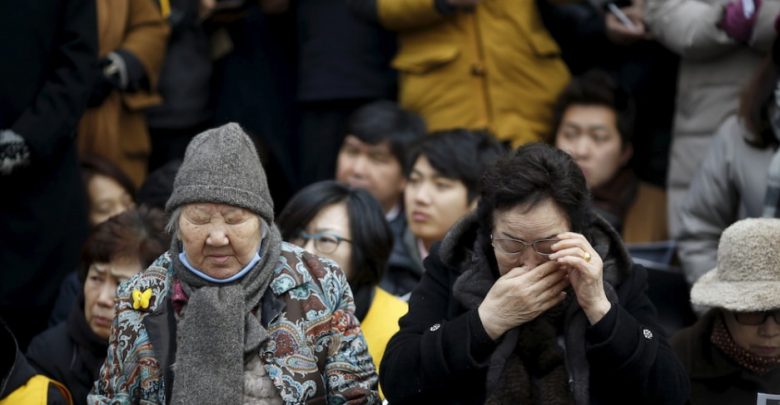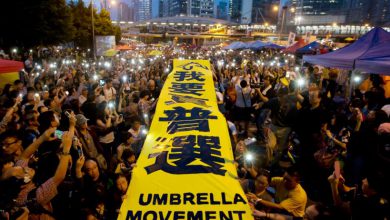AllAsia and OceaniaOngoing
Seoul, Tokyo Spar over Recognition of Korean Comfort Women
The World War II-era issue surrounding former Korean Comfort Women continues to plague ties between Seoul and Tokyo. When will a resolution to the issue finally be accepted?

South Korea and Japan continue to spar over issues ruminating from World War II. Recently, Seoul moved to shut down a fund started by Japan which aimed to fund former comfort women as reparation for World War II. In addition to the issue of Korean Comfort Women, the two countries have experienced a spat over reparations for forced labor for private Japanese companies which conscripted Korean workers during wartime. Why does this issue continue to plague relations between the two countries? Is there an end in sight?
Who Were Korean Comfort Women?
During the period of Japanese Imperial occupation of South East Asia, the Imperial army created a system of brothels in order to prevent mass wartime rapes by soldiers. Called “comfort stations,” these brothels (run by locals to serve military in the occupied countries) employed local women. These women became known as “ianfu,” the Japanese euphemism for prostitute.
A recent and corrected estimation puts the number of Comfort Women serving all over the Japanese empire at about 20,000. Formerly the number was estimated to be higher but was proven erroneous by a falsified newspaper publication by a former Japanese soldier.
Since the defeat of the Japanese Empire following the bombings of Nagasaki and Hiroshima, the system subsequently disbanded and the countries that Japan occupied gained their own respective independences. Since, former Korean Comfort Women and those who served in other countries have come forward to speak about their experiences in the war, demanding apologies and reparations from Japan. Amicably, the country has offered several apologies, treaties and funds attempting to put the issue to rest finally and irreversibly.
Apologizing and Healing, Asian Style
The Treaty on Basic Relations between Japan and the Republic of Korea was signed on June 22nd, 1965. The document established basic diplomatic ties between Japan and South Korea. This collaboration was preceded by talks between 1951 and 1965 which aimed to normalize relations between the two countries. This document was a source of debate in the most recent forced labor row between Japan and South Korea, as claims to all compensation between the two countries were to be solved through the ratification and implementation of this document.
However, former wartime employees of the Nippon Steel & Sumimoto Metal Corporation were awarded damages form a South Korean high court much to the dismay of the Japanese delegation. Regarding the occupation of Korea from Imperial Japan, the treaty also declared “It is confirmed that all treaties or agreements concluded between the Empire of Japan and the Empire of Korea on or before August 22, 1910 are already null and void.”
In addition, agreements between the two regarding settlements of issues varying from property claims, comfort women and economic cooperation was also agreed upon. Japan provided $300 million grant in aid, $200 million in official government loans, and an additional $300 million in loans from a private trust to be distributed to surviving Korean Comfort Women.
Alongside these agreements, the 1994 establishment of the Asian Women’s Fund by Japan was meant to once again settle the diplomatic matter between the two countries. The Asian Women’s Fund was a fund established by the Japanese government in 1994, which aimed to distribute financial compensation to surviving comfort women in South Korea, along with the Philippines, Taiwan, the Netherlands, and Indonesia. In private donations, approximately 600 million Yen were raised. The government of Japan provided 4.8 billion Yen to the fund, and it was the responsibility of South Korea to allocate the, as necessary. Many of the former Korean Comfort Women faced very harsh lives after the war, as their society shunned them for being impure and not deserving of respect. Many lived well in to their elder years alone and unmarried.
The 2015 Comfort Women Agreement
On December 28th, 2015, a bilateral agreement created between Japan and South Korea was signed. The 2015 Comfort Women Agreement aimed to “finally and irreversibly” bring the longstanding comfort women issue to an end. This agreement was met with acclaim by many nations including United States, the United Kingdom, and Germany.
The argument contained three main pillars. The first included a sincere apology for their wartime conduct in relation to Korean comfort women. Second, Japan agreed to pay 1 billion yen to South Korea to establish a benefit fund for the women. Thirdly, the two agreed to resolve an issue regarding the erection of a comfort women statue in front of the Japanese Embassy in Seoul.
While the first two pillars were met by the Japanese, the South Korean government did not remove the statue. Furthermore, an additional statue was installed in front of the Japanese consulate in Busan. Internationally, these statues are a violation of the 1961 Vienna Convention. An article of the convention obligates a host country to protect foreign diplomatic missions against “disturbance of the peace” or “impairment of its dignity.”
Another issue plaguing the two is the erection of comfort women statues in various locations all over the globe. Alongside the Wednesday Demonstration in Busan, different civil groups have funded and maintained statues meant to represent former comfort women. The Japanese take particular offense to this, as it is seen as a way for Korea and groups representing them to wedge a gap between peaceful countries. The latest to be affected was the sister city relationship between Osaka in Japan and San Francisco in the United States, as a decades old sister city designation between the two was officially severed several months ago following the erection and maintenance of a Comfort Woman statue.
The current battle between the two countries regarding compensation of former Korean Comfort Women seems to lie in the hands of South Korea, as Japan has offered various concessions and reparations throughout the years. Hopefully, the two can settle the issue finally and irreversibly in time for the elderly former Comfort Women to see it come to fruition.




